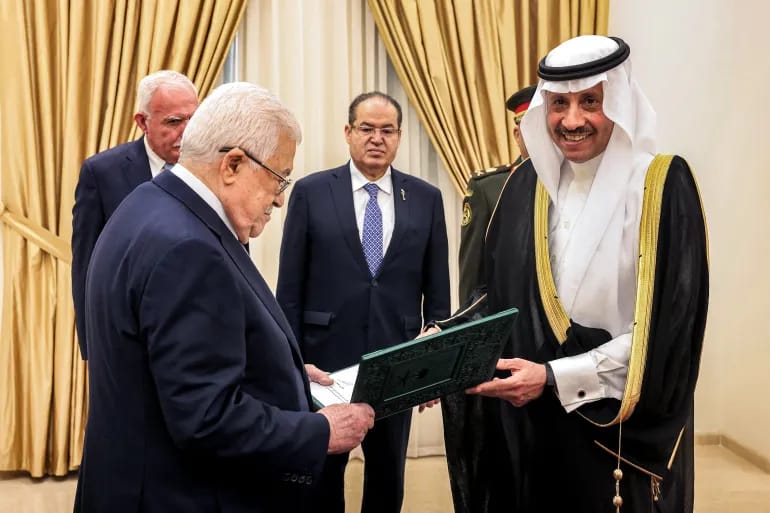In a historic move hailed as a groundbreaking milestone in their bilateral relationship, the Palestinian Authority has welcomed the arrival of Saudi Arabia’s first-ever ambassador to Palestine, Nayef al-Sudairi. This significant development signifies a strengthening of ties between the two nations. Al-Sudairi, who currently serves as Saudi Arabia’s ambassador to Jordan, is on the verge of presenting his credentials to Palestinian Authority President Mahmoud Abbas. His visit to the occupied West Bank marks a significant step towards enhancing diplomatic relations, despite lingering regional complexities.
A Historic Visit to the Occupied West Bank
Al-Sudairi and his accompanying delegation made a historic arrival in the occupied West Bank through the Karama crossing from Jordan on Tuesday. Their two-day official visit, set to conclude on Wednesday, has been met with anticipation and optimism. During his visit, Al-Sudairi is scheduled to engage in crucial meetings with Palestinian Foreign Minister Riyad al-Maliki, President Mahmoud Abbas, and Prime Minister Mohammad Shtayyeh. The visit holds the promise of fostering closer cooperation and understanding between the two nations.
Warm Welcome and Optimism
The Palestinian Ministry of Foreign Affairs extended a warm welcome to the visiting Saudi ambassador, deeming his arrival “a historic milestone for developing fraternal relations between the two sister countries.” This sentiment of optimism was echoed by PLO Secretary-General Hussein al-Sheikh, who affirmed, “We welcome His Excellency the Ambassador of the Kingdom of Saudi Arabia to the State of Palestine, who will present his official credentials.” This gesture signifies the eagerness of both nations to strengthen their bonds.
Complex Diplomatic Landscape
Al-Sudairi’s appointment as Saudi Arabia’s ambassador to Palestine was announced last August, when he was also designated as the consul general in Jerusalem. However, Israel raised objections to the establishment of a Saudi consulate in Jerusalem, a city it claims as its own capital. Israeli Foreign Minister Eli Cohen clarified that while al-Sudairi could meet with Palestinian Authority representatives in Jerusalem, there would be no fixed Saudi presence in the city. The status of Jerusalem remains a contentious issue, with the international community not recognizing it as Israel’s capital.
Transitioning Towards Diplomatic Progress
Al-Sudairi’s appointment as the first Saudi ambassador to Palestine occurs against the backdrop of ongoing speculation regarding potential diplomatic relations between Saudi Arabia and Israel. While the United States exerts pressure to facilitate such relations, a formal agreement appears distant due to multifaceted concerns. These include Saudi Arabia’s nuclear power development and Israel’s operations in the occupied West Bank. Riyadh has consistently reaffirmed its adherence to the Arab League’s stance of refraining from establishing relations with Israel until the Palestinian crisis is effectively resolved.
In conclusion, the arrival of Ambassador Nayef al-Sudairi represents a turning point in the diplomatic landscape of the Middle East. It signals a willingness on the part of Saudi Arabia and the Palestinian Authority to foster closer ties, even as regional complexities persist. As both nations engage in dialogue and diplomacy, the eyes of the international community remain fixed on the region, hoping for progress towards a lasting resolution to the Palestinian crisis.















